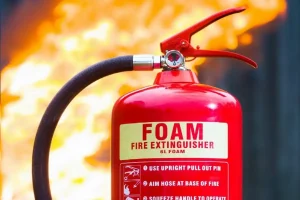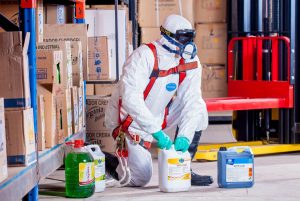 In today’s fast-evolving workplace, conducting regular health and safety audits has become more important than ever. Companies are operating in dynamic environments with ever-changing regulations, technological advancements, and new health risks. Here’s why regular audits are essential for maintaining a safe and compliant workplace in 2024:
In today’s fast-evolving workplace, conducting regular health and safety audits has become more important than ever. Companies are operating in dynamic environments with ever-changing regulations, technological advancements, and new health risks. Here’s why regular audits are essential for maintaining a safe and compliant workplace in 2024:
Regulatory bodies are continuously updating health and safety standards, especially in response to increased awareness of environmental, mental health, and ergonomic issues. Regular audits help companies stay compliant with these evolving standards, avoiding costly fines and ensuring employee safety.
Safety audits reveal potential hazards before they turn into incidents. By systematically identifying risks—whether it’s an equipment malfunction, inadequate emergency exits, or repetitive strain issues—companies can address them proactively, reducing the chance of injuries and operational disruptions.
Regular audits demonstrate a commitment to safety, encouraging employees to prioritize it in their daily tasks. When employees see that their company values their well-being, it fosters a culture of care, accountability, and shared responsibility for maintaining a safe workplace.
Safety audits often uncover inefficiencies that can affect productivity. For example, a well-organised workspace not only reduces accident risk but also makes it easier for employees to work effectively. By addressing these factors, companies can streamline operations while improving safety.
Final Thoughts
In 2024, regular health and safety audits aren’t just a regulatory requirement—they’re a proactive strategy to protect employees, optimize operations, and build a safety-conscious workplace culture. By investing in these audits, companies create a safer, more productive environment for everyone involved.
Contact us if you require further information.
Starting July 2 025, the use of Aqueous Film-Forming Foam (AFFF) fire extinguishers, widely used to combat flammable liquid fires, will be banned due to their harmful environmental and health effects.
025, the use of Aqueous Film-Forming Foam (AFFF) fire extinguishers, widely used to combat flammable liquid fires, will be banned due to their harmful environmental and health effects.
The ban primarily targets C8-based firefighting foams containing long-chain PFAS compounds like PFOA. These substances are being phased out due to their environmental persistence and associated health risks. However, C6-based foams, which use shorter-chain PFAS compounds, are not currently included in the ban. They are considered a safer alternative and are still permitted under UK regulations.
That said, the UK government and environmental agencies are keeping a close watch on PFAS regulations, and future restrictions on all PFAS-based products, including C6 foams, remain possible as part of broader environmental policies .
Here are some recommended alternatives for various industry needs if your business has C8 foam fire extinguishers on site:
Businesses should plan now to transition their equipment, as proper disposal of existing C8 AFFF extinguishers will also be required by certified hazardous waste disposal services.
This proactive approach will ensure compliance with the 2025 deadline and maintain a safe, environmentally responsible fire safety system.
Contact us if you have any questions.
Over 1.7 million workers in the UK suffered from work-related illnesses in 2022 alone. This figure highlights the critical importance of preventive measures and early detection of health risks to protect employees and ensure the smooth running of businesses.
By proactively managing these risks, companies can reduce absenteeism, improve productivity, and avoid costly legal implications.
The Importance of Prevention in the Workplace
Preventive measures are crucial for creating a safe and healthy work environment. Hazards such as prolonged exposure to harmful substances and poor air quality can lead to serious health problems over time. These risks can manifest as musculoskeletal disorders, respiratory illnesses, and occupational cancers.
By implementing preventive strategies, employers can mitigate risks before they become serious threats.
Steps for effective preventative measures
The benefits of early detection and prevention
Proactively managing health risks in the workplace provides numerous benefits, both for employees and employers. Some of these include:
Reduced Absenteeism: By preventing illnesses and injuries, businesses can reduce the number of days lost to sickness, helping maintain productivity and morale.
Lower Costs: Early detection and intervention can prevent costly medical treatments, compensation claims, and lost productivity due to long-term illnesses.
Increased Employee Engagement: A strong focus on health and safety fosters a positive work environment, leading to higher employee satisfaction and engagement.
Legal Compliance: Regular risk assessments, surveillance, and monitoring ensure that businesses comply with health and safety regulations, reducing the risk of legal action or fines.
We can help:
We are committed to helping businesses protect their workforce by emphasising preventive measures and early detection of health risks. Our team of highly qualified occupational health and safety specialists provide a range of services, including:
Occupational hygiene is the science of anticipating, recognising, evaluating, and controlling workplace conditions that may cause workers’ injury or illness. It focuses on identifying and mitigating health risks arising from exposure to hazardous substances, noise, dust, chemicals, and other physical, biological, and ergonomic factors in the workplace.
Surveys and assessments include – exposure monitoring, vibration assessments, noise assessments, air quality monitoring, LEV maintenance.
Contact us for further information.
 Employers have been advised to develop an emergency response plan for monkey pox (mpox), so they are better prepared to manage a potential outbreak of the infectious disease, especially any strains that have not been reported yet in the UK.
Employers have been advised to develop an emergency response plan for monkey pox (mpox), so they are better prepared to manage a potential outbreak of the infectious disease, especially any strains that have not been reported yet in the UK.
Monkeypox is a viral disease caused by the monkeypox virus, which is related to the smallpox virus. It primarily spreads through close contact with infected animals or humans, contaminated materials like bedding or clothing, and respiratory droplets. Symptoms can include:
The rash usually goes through several stages before forming scabs and falling off, and the illness typically lasts 2-4 weeks.
What to do if you catch it:
Monkeypox is generally mild but can be more severe in people with weakened immune systems, young children, and pregnant women.
Here is a link to an article written by IOSH.
UK employers advised to develop emergency response plans for mpox | IOSH magazine
If you require further information, contact us.
 DSEAR stands for Dangerous Substances and Explosive Atmospheres Regulations 2002, which requires employers to keep workers safe from the risks of fire, explosions and substances corrosive to metals.
DSEAR stands for Dangerous Substances and Explosive Atmospheres Regulations 2002, which requires employers to keep workers safe from the risks of fire, explosions and substances corrosive to metals.
DSEAR ensures that people are protected from these risks to their safety in the workplace, and to any members of the public that are in proximity of the working activities.
Both fire and health and safety assessments can be carried out to highlight where DSEAR regulations need to come into place, where the assessments find any issues involving dangerous substances and explosives that aren’t properly managed and controlled.
If a fire assessment was to flag a potential fire or explosion risk due to dangerous substances, DSEAR regulations can then be put in place to control and prevent an incident from taking place.
Fires and explosions create harmful physical effects, such as thermal radiation, oxygen depletion and overpressure effects. Substances that are corrosive to metal may cause damage to structures containing metal, which can reduce structural integrity.
Employers must:
Contact us if you require further information.